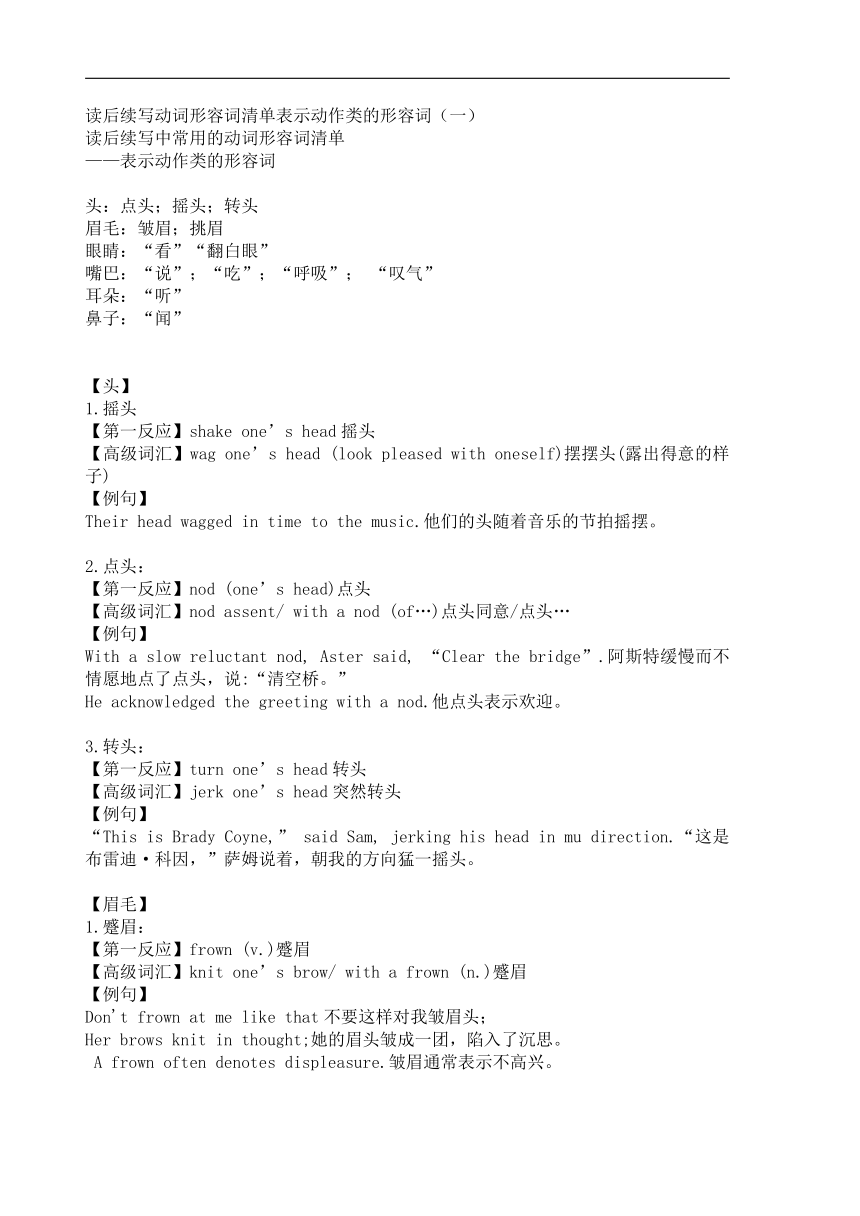-2024届高三英语二轮复习读后续写表示动作类的形容词(一)动词形容词清单
文档属性
| 名称 | -2024届高三英语二轮复习读后续写表示动作类的形容词(一)动词形容词清单 |  | |
| 格式 | docx | ||
| 文件大小 | 19.7KB | ||
| 资源类型 | 教案 | ||
| 版本资源 | 通用版 | ||
| 科目 | 英语 | ||
| 更新时间 | 2024-04-04 10:14:24 | ||
图片预览

文档简介
读后续写动词形容词清单表示动作类的形容词(一)
读后续写中常用的动词形容词清单
——表示动作类的形容词
头:点头;摇头;转头
眉毛:皱眉;挑眉
眼睛:“看”“翻白眼”
嘴巴:“说”;“吃”;“呼吸”; “叹气”
耳朵:“听”
鼻子:“闻”
【头】
1.摇头
【第一反应】shake one’s head摇头
【高级词汇】wag one’s head (look pleased with oneself)摆摆头(露出得意的样子)
【例句】
Their head wagged in time to the music.他们的头随着音乐的节拍摇摆。
2.点头:
【第一反应】nod (one’s head)点头
【高级词汇】nod assent/ with a nod (of…)点头同意/点头…
【例句】
With a slow reluctant nod, Aster said, “Clear the bridge”.阿斯特缓慢而不情愿地点了点头,说:“清空桥。”
He acknowledged the greeting with a nod.他点头表示欢迎。
3.转头:
【第一反应】turn one’s head转头
【高级词汇】jerk one’s head突然转头
【例句】
“This is Brady Coyne,” said Sam, jerking his head in mu direction.“这是布雷迪·科因,”萨姆说着,朝我的方向猛一摇头。
【眉毛】
1.蹙眉:
【第一反应】frown (v.)蹙眉
【高级词汇】knit one’s brow/ with a frown (n.)蹙眉
【例句】
Don't frown at me like that不要这样对我皱眉头;
Her brows knit in thought;她的眉头皱成一团,陷入了沉思。
A frown often denotes displeasure.皱眉通常表示不高兴。
2.挑眉:
【第一反应】raise one’s eyebrow扬起眉毛
【高级词汇】lift one’s eyebrow/a lift of one’s eyebrow扬起眉毛/抬一下眉毛
【例句】
I’ll lift my eyebrows if anything is wrong.如果出了什么事,我就抬眉毛。
She raised her eyebrows comically.她滑稽地扬起眉毛。
【眼睛】
1.看:
look/see/watch看;observe观察,call on(upon)呼吁
Observe what is best and to strive to universalize these qualities. 观察什么是最好的,然后努力使这些特质得以普遍化。
Sofia was intending to call on Miss Kitts.
索菲娅打算去拜访基茨小姐。
2.翻白眼:
show the whites of one's eyes露出白眼 ;rolling one’s eyes翻白眼
Rolling your eyes or complaining about your job can hurt your effectiveness in the eyes of coworkers or bosses.翻白眼或四处抱怨你的工作只会毁坏你在上司和同事心目中的印象。
【嘴巴】
1.说:
say/speak/talk说; explain/scold解释/骂; criticize批评
The mother gave her child a scolding for his wrongdoing.孩子做错了事, 母亲说了他一顿。
He explained and explained, but I still couldn't understand.他说了又说, 我还是不懂。
1.吃:
eat吃;nosh/eat off/engorge,gobble(狼吞虎咽)
That weekend, we are god-given leisure, the person of two good appetite in spirits ground prepares engorge. 那个周末,我们都难得闲暇,两个好胃口的人都兴致勃勃地预备大吃一顿。
2.呼吸:
breath呼吸;respire呼吸,respiration/pant呼吸,gasp(喘气)
After the long race, the runner was panting for breath.长跑之后, 那个运动员正在喘气。
3.叹气:
sigh叹气
1. At last, he gave a deep sigh(舒气) of relief.最后,他深深地叹了一口气(舒气)。
2. “I cannot but accept it ” he sighed(叹气) and walked out.“我只能接受。”他叹了口气(叹气),然后离开了。
【耳朵】
听:
hear, listen to, overhear听
1. I heard(听到) a loud noise exploding around the corner.我听到(听到)一声巨响在拐角处爆炸。
2. The boys were listening to(听) the teacher attentively.男孩子们正在聚精会神地听(听)老师讲课。
3. I just overheard(无意间听到,偷听到) it that they decided to send him away. 我只是无意中听到(无意间听到,偷听到)他们决定把他送走。
【鼻子】
闻:
smell闻, sniff嗅, follow the scent跟着气味走
1. The village is severely polluted and you can smell(闻到) the sewage everywhere.这个村庄污染严重,到处都能闻到(闻到)污水的味道。
2. They are training these dogs to sniff out(嗅出) drugs.他们正在训练这些狗嗅出(嗅出)毒品。
3. However, from the ground came a familiar scent as the dog lowered his head. He followed the scent(循着气味) and walked across the grassland.然而,当狗低下头时,从地上传来了一种熟悉的气味。他循着气味(循着气味)走过草原。
读后续写中常用的动词形容词清单
——表示动作类的形容词
头:点头;摇头;转头
眉毛:皱眉;挑眉
眼睛:“看”“翻白眼”
嘴巴:“说”;“吃”;“呼吸”; “叹气”
耳朵:“听”
鼻子:“闻”
【头】
1.摇头
【第一反应】shake one’s head摇头
【高级词汇】wag one’s head (look pleased with oneself)摆摆头(露出得意的样子)
【例句】
Their head wagged in time to the music.他们的头随着音乐的节拍摇摆。
2.点头:
【第一反应】nod (one’s head)点头
【高级词汇】nod assent/ with a nod (of…)点头同意/点头…
【例句】
With a slow reluctant nod, Aster said, “Clear the bridge”.阿斯特缓慢而不情愿地点了点头,说:“清空桥。”
He acknowledged the greeting with a nod.他点头表示欢迎。
3.转头:
【第一反应】turn one’s head转头
【高级词汇】jerk one’s head突然转头
【例句】
“This is Brady Coyne,” said Sam, jerking his head in mu direction.“这是布雷迪·科因,”萨姆说着,朝我的方向猛一摇头。
【眉毛】
1.蹙眉:
【第一反应】frown (v.)蹙眉
【高级词汇】knit one’s brow/ with a frown (n.)蹙眉
【例句】
Don't frown at me like that不要这样对我皱眉头;
Her brows knit in thought;她的眉头皱成一团,陷入了沉思。
A frown often denotes displeasure.皱眉通常表示不高兴。
2.挑眉:
【第一反应】raise one’s eyebrow扬起眉毛
【高级词汇】lift one’s eyebrow/a lift of one’s eyebrow扬起眉毛/抬一下眉毛
【例句】
I’ll lift my eyebrows if anything is wrong.如果出了什么事,我就抬眉毛。
She raised her eyebrows comically.她滑稽地扬起眉毛。
【眼睛】
1.看:
look/see/watch看;observe观察,call on(upon)呼吁
Observe what is best and to strive to universalize these qualities. 观察什么是最好的,然后努力使这些特质得以普遍化。
Sofia was intending to call on Miss Kitts.
索菲娅打算去拜访基茨小姐。
2.翻白眼:
show the whites of one's eyes露出白眼 ;rolling one’s eyes翻白眼
Rolling your eyes or complaining about your job can hurt your effectiveness in the eyes of coworkers or bosses.翻白眼或四处抱怨你的工作只会毁坏你在上司和同事心目中的印象。
【嘴巴】
1.说:
say/speak/talk说; explain/scold解释/骂; criticize批评
The mother gave her child a scolding for his wrongdoing.孩子做错了事, 母亲说了他一顿。
He explained and explained, but I still couldn't understand.他说了又说, 我还是不懂。
1.吃:
eat吃;nosh/eat off/engorge,gobble(狼吞虎咽)
That weekend, we are god-given leisure, the person of two good appetite in spirits ground prepares engorge. 那个周末,我们都难得闲暇,两个好胃口的人都兴致勃勃地预备大吃一顿。
2.呼吸:
breath呼吸;respire呼吸,respiration/pant呼吸,gasp(喘气)
After the long race, the runner was panting for breath.长跑之后, 那个运动员正在喘气。
3.叹气:
sigh叹气
1. At last, he gave a deep sigh(舒气) of relief.最后,他深深地叹了一口气(舒气)。
2. “I cannot but accept it ” he sighed(叹气) and walked out.“我只能接受。”他叹了口气(叹气),然后离开了。
【耳朵】
听:
hear, listen to, overhear听
1. I heard(听到) a loud noise exploding around the corner.我听到(听到)一声巨响在拐角处爆炸。
2. The boys were listening to(听) the teacher attentively.男孩子们正在聚精会神地听(听)老师讲课。
3. I just overheard(无意间听到,偷听到) it that they decided to send him away. 我只是无意中听到(无意间听到,偷听到)他们决定把他送走。
【鼻子】
闻:
smell闻, sniff嗅, follow the scent跟着气味走
1. The village is severely polluted and you can smell(闻到) the sewage everywhere.这个村庄污染严重,到处都能闻到(闻到)污水的味道。
2. They are training these dogs to sniff out(嗅出) drugs.他们正在训练这些狗嗅出(嗅出)毒品。
3. However, from the ground came a familiar scent as the dog lowered his head. He followed the scent(循着气味) and walked across the grassland.然而,当狗低下头时,从地上传来了一种熟悉的气味。他循着气味(循着气味)走过草原。
